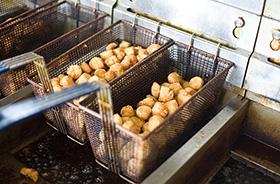Avoiding clogged pipes
Never pour fat, oil, or grease down the sink drain or toilet.
The fat, oil, and grease we use for cooking doesn't break down during the wastewater treatment process.
FOG that's disposed of down the drain solidifies in cold weather, clings to pipes, and builds up over time. This buildup creates blockages in pipes that cause sewage to back up through sinks, floor drains, and toilets: a dirty, stinky, and costly mess.
Disposing of solid FOG
Take these 2 simple steps to properly dispose of fats, oil, and grease that will harden:
- Pour it into a heat-safe container or leave it in the pan to cool and harden.
- Scrape the hardened FOG into your organics kitchen container or straight into your green bin.
If you don't have a kitchen container or green bin, scrape the FOG into your garbage.
Disposing of liquid FOG
If the fat, oil, or grease won’t harden when cooled you can:
- Pour small liquid amounts into your kitchen container or green bin.
- Drop off large amounts of cooking oil for free at any Peel Region Community Recycling Centre.
Trash bad habits, not toilets
FOG build up is the number one cause of sewage backups in restaurant and food businesses. Clogged pipes can lead to business closures, lost income, and costly repairs.
Preventing FOG build-up in wastewater pipes

You can avoid FOG build-up at your restaurant or food business by:
- Wiping or scraping dishes of excess oil and food particles before washing.
- Placing screens over drains.
- Cooling then disposing of solid particles, oil, and grease in your compost or garbage.
- Working with a third-party recycling facility to correctly dispose of large amounts of used cooking oil.
- Installing a grease trap or interceptor.
- Following manufacturer instructions for inspecting and cleaning grease traps.
- Training employees on proper FOG management.
Grease trap maintenance
Grease traps and interceptors separate and collect FOG to stop it from entering the sanitary sewer system. FOG floats to the top of the trap and food waste settles to the bottom. Only the remaining water continues into the sewer system.
Grease trap installation is mandatory under the Ontario Building Code. Cleaning and maintaining your grease trap or interceptor is very important. Follow the manufacturer's instructions for inspecting and cleaning your grease trap regularly.
A sewer blockage caused by FOG can cause raw sewage to back up into your building, neighbouring businesses, streets, and parks.
Cleaning up this sewage is unpleasant and expensive. Usually, the business or building owner has to pay for the cleanup.
- diapers
- household hazardous waste
- paper towels
- rags
- sanitary napkins
- disposable wipes
All storm sewers lead to your water.
- Our storm sewer system drains into rivers, streams and lakes and can seep into the ground.
- What goes in the storm sewer can contaminate drinking water sources.
For more information about properly disposing of items that can damage wastewater systems, refer to:
I Don't Flush details the risks in flushing pharmaceuticals, FOG, household hazardous waste, and personal hygiene products down the toilet.
Ontario Clean Water Agency (OCWA)
The OCWA works to ensure that all Ontario communities have access to safe and reliable water and wastewater services.
The Clean Water Foundation partners with Uganda communities to drill wells, provide solar-powered pumps and taps, and water towers and ensure they're sustainable for the future.